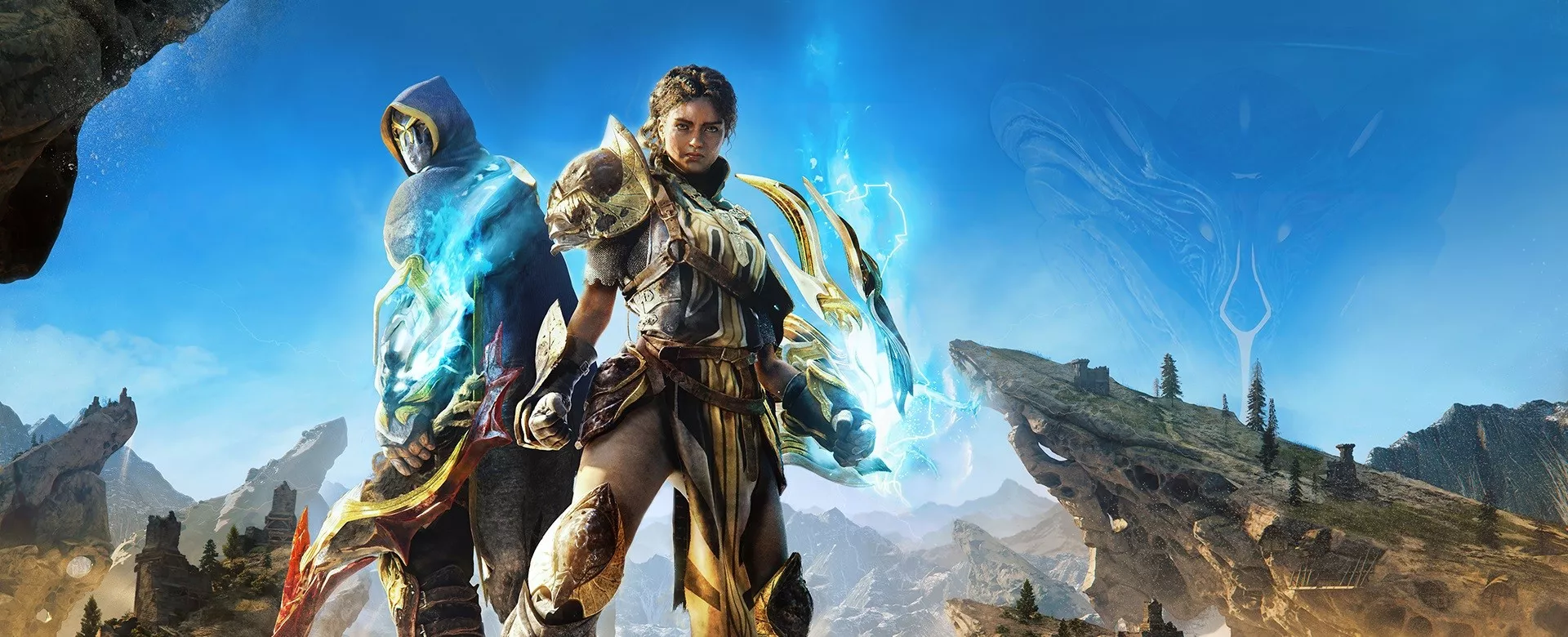Atlas Fallen showcases intriguing world-building and lore, but its narrative falls flat due to an uninspiring plot, lackluster character performances, and monotonous combat mechanics, resulting in a rather tedious gameplay experience.
Over nearly a decade, Deck13 has been a prominent player in the Soulslike genre. Originally a supporting studio for Lords of the Fallen in 2014, they went on to develop The Surge 1 and 2, both of which garnered mostly positive feedback. While these titles didn’t quite reach the heights of their FromSoftware inspirations, they displayed competence and enjoyment, amassing a dedicated fan base over time. However, with Atlas Fallen, Deck13 has taken a different direction, venturing into the realm of traditional action games with Metroidvania elements. Unfortunately, this departure hasn’t proven successful, as Atlas Fallen frequently fails to deliver.
Blending influences from games like God of War and Darksiders, Atlas Fallen attempts to construct an engaging open world reminiscent of Horizon Zero Dawn. Regrettably, it struggles to excel in any particular aspect and ends up as a middling experience. At its best, the combat system relies heavily on parrying, employing a rinse-and-repeat formula, while at its worst, Atlas Fallen feels hollow and rigid, as if corners were cut to meet deadlines. Although the game does have a few redeeming moments scattered amidst its desert landscapes, these bright spots are hardly worth unearthing from the vast expanse of tedium and repetition that characterize Deck13’s Metroidvania attempt.
Granted, Atlas Fallen’s initial premise and core story beats do create a favorable first impression. The narrative revolves around an antagonist named Thelos, an evil Sun god who enslaves a faction of humanity known as the Unnamed, forcing them to mine Essence for him, thus causing widespread devastation on the planet. To maintain control, Thelos deploys Wraiths to terrorize and prey upon the majority of Atlas’s inhabitants. The game’s lore and world-building possess genuine allure, enriched by intriguing morsels of information found within the game’s numerous collectibles. However, the actual execution of the main story and its presentation transform this promising concept into a mundane ordeal.
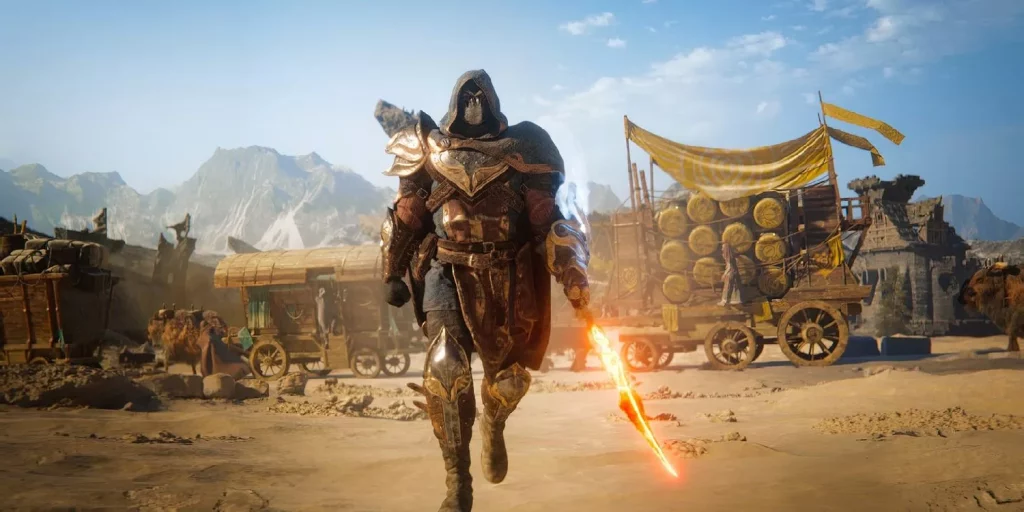
Players step into the shoes of the protagonist, referred to as the Gauntlet Bearer, whose journey quickly unfolds. Atlas Fallen exhibits a haste to rush through pivotal plot elements, propelling the protagonist from enslavement to acquiring a magical gauntlet inhabited by a god named Nyaal, and eventually achieving revered status within Atlas, all within a matter of hours. This breakneck pace diminishes the impact of the story’s twists and turns, rendering many plot developments insignificant or treated as afterthoughts, as though substantial portions of the narrative were inexplicably excised.
Most disappointingly, the central plot of Atlas Fallen revolves predominantly around gathering fragmented pieces of the gauntlet, followed by a sprint towards the climax. Roughly two-thirds of the primary story missions entail journeying to an objective, solving a rudimentary puzzle, and engaging in combat against a sizable wraith, all to obtain a fragment of the gauntlet that unlocks new abilities. These abilities encompass enhanced mid-air mobility and the power to extract weightier objects from the ground, thus granting access to previously inaccessible areas. This cycle is repeated for each of the four gauntlet pieces, comprising the bulk of the gameplay experience. The resulting feeling is one of incomplete storytelling, as if segments of the narrative were omitted or truncated.
Collectively, Atlas Fallen reads as a first act that rushes precipitously towards its conclusion, content with this abbreviated narrative structure. However, players are likely to disengage from the main plotline long before the credits roll due to subpar vocal performances and an unwieldy presentation that severely undermines the game’s overall quality.
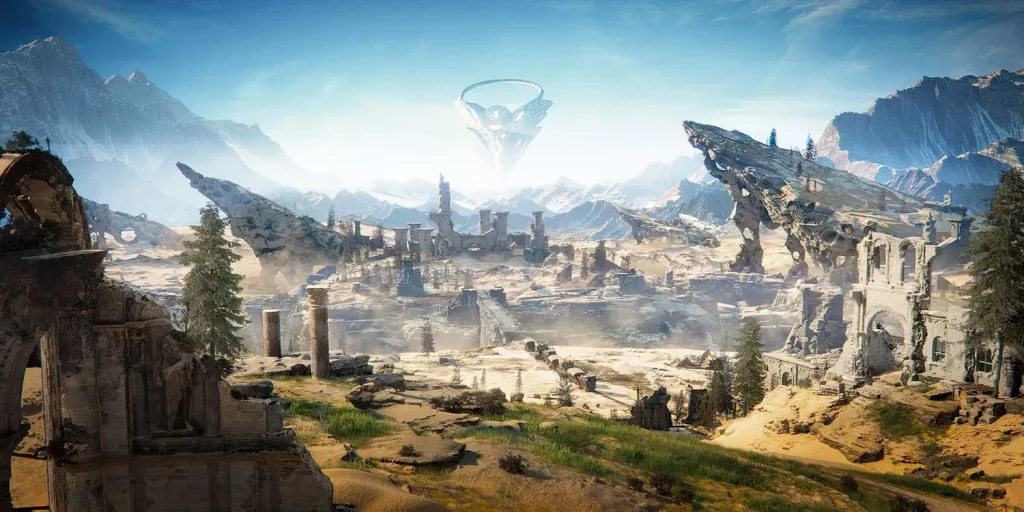
Despite operating within constraints of budget and resources, Focus Home Interactive and Deck13 consistently aim high. However, even considering their non-AAA status, Atlas Fallen stumbles in the domains of voice acting and presentation, ranking among the year’s poorest in premium gaming. Nearly every character and NPC encountered projects a flat, emotionless tone, often detached from ongoing conversations. It’s as though those delivering the lines lacked contextual understanding and had to improvise. Characters are overwhelmingly one-dimensional, leaving the game devoid of vitality and authenticity, excluding Nyaal, the speaking gauntlet.
Amid the sea of lifeless characters, Nyaal adds to the collection of conversing accessories seen in video games, offering comic relief and excessive exposition. Although Nyaal’s delivery mirrors the disjointed style of others, there’s a contrived liveliness, resembling a forced and insincere portrayal. The studio’s attempt to replicate Iron Man’s Jarvis falls short of capturing the character’s natural charisma, yielding a jarring result.
Notwithstanding a lackluster narrative and a plethora of subpar performances, Atlas Fallen’s visuals and graphics maintain some intrigue throughout its approximately 11-hour campaign, supplemented by side content. The expansive landscape appears impressive, with vistas extending over vast distances, all under the looming oppression of Thelos. Despite the potential for monotony in a desert setting, Deck13 adeptly crafts a visually captivating and diverse world. Yet, engaging activities within Atlas are limited.
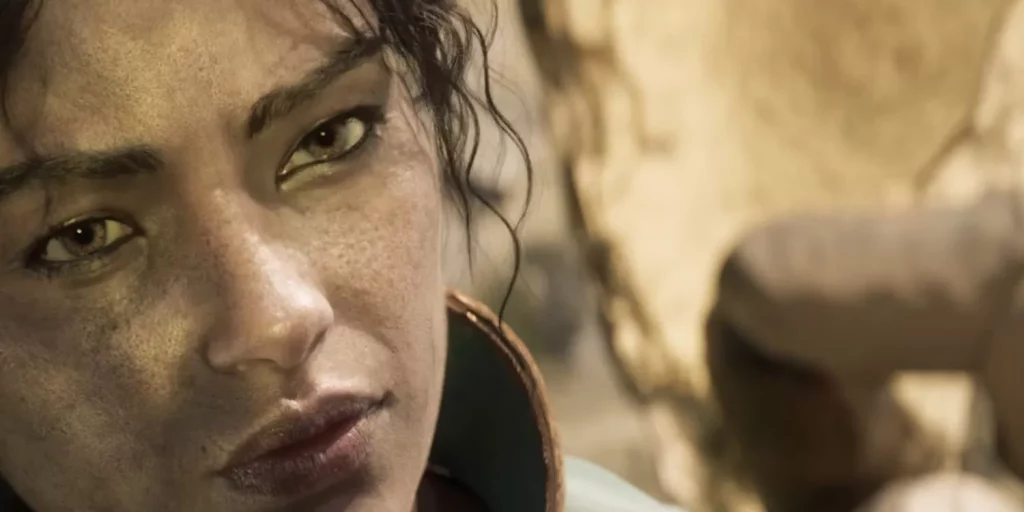
Most side missions in Atlas Fallen are reduced to fetch quests or Wraith hunting, lacking depth. The game introduces an entire “Errands” category, suggesting that Atlas requires tidying up and only the Gauntlet Bearer is up to the task. Occasional puzzles pepper the game’s four zones, yet they typically involve platform-raising or timed beacon lighting, culminating in a return to the starting point. The allure of these puzzles fades quickly, and the rewards fail to justify the effort. Much of Atlas Fallen’s open world can be brushed aside without leaving players with a sense of missing substantial content.
One of the game’s major letdowns is its combat, which, while initially promising, deteriorates into boredom. Initially, the “Momentum” mechanic introduces an intriguing dynamic—damage output rises as players accumulate hits on enemies. However, this approach seldom materializes as expected. The combat’s beginning stages feel lackluster, as damage remains minimal until reaching tier three. At this point, player damage and enemy resilience are balanced out by perks, undermining the risk-reward dynamic. Ultimately, Atlas Fallen’s distinctive combat concept falters, resulting in an uneven and insubstantial system that can make battles feel tedious.
The game also grapples with artificial difficulty and rudimentary enemy mechanics that grow stale rapidly. Most Wraith encounters involve a predictable sequence of attacks, quickly becoming monotonous. Beyond initial adjustments, little complexity accompanies these battles. Despite diverse Wraith designs, many boss fights mirror larger versions of previously encountered Wraiths. As the game progresses, combat feels repetitive and disconnected, lacking the weight and satisfaction needed to engage players.
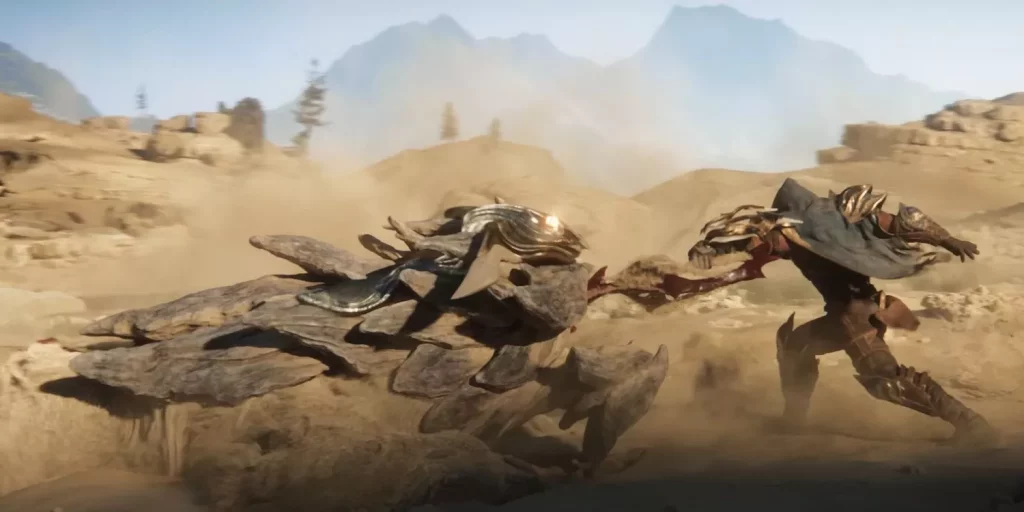
Furthermore, Atlas Fallen’s combat mechanics often lack weight, compounded by sponge-like enemies, rendering confrontations unsatisfying. Moments of fluid combat grace the experience sporadically, yet they are too infrequent to warrant the investment. Combat becomes a tiresome routine, essential for acquiring Gauntlet fragments to replicate in each new zone.
Atlas Fallen shows promise, yet its goals remain unattained and unrealized. The game’s lackluster story, replete with generic voice acting, coupled with a combat system that loses appeal before the credits roll, render it largely forgettable and unworthy of completion. Deck13’s new IP features surface-level attractions—stunning landscapes, captivating world-building, and aesthetics. Yet, delving deeper, the game exposes its emptiness.
